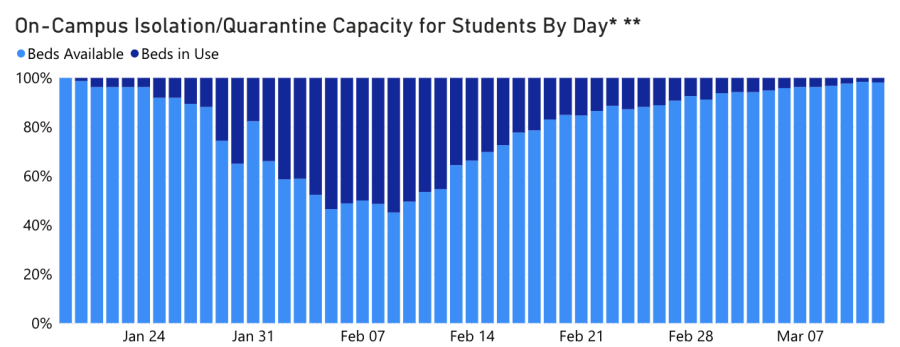Student Questions: Herd Immunity on The Horizon?
Graph of On-Campus Isolation/Quarantine Capacity for Student By Day.
March 17, 2021
A week into the second semester, the University experienced a COVID-19 spike that made every Villanovan question whether or not staying for the entirety of the semester was still a possibility.
For a week straight, from the end of January to the first few days in February, daily new cases were in the 60-70 range, forcing the school to acquire another hotel for quarantine and isolation space. Thankfully, the spike eventually peaked at 76 new daily cases and started a downward trend. Now, a month and a half after the spike, a question every student may be asking is whether herd immunity for the Villanova community is on the horizon. The answer is complicated.
According to the World Health Organization, herd immunity is defined as “the indirect protection from an infectious disease that happens when a population is immune either through vaccination or immunity developed through previous infection.”
It is obvious that the University has had a significant amount of COVID-19 infections, but were those cases enough for Villanova to become a campus protected by herd immunity? There is an ongoing debate as to how long COVID-19 antibodies last after a person has been infected. According to the CDC, it is three months, despite differing medical opinions from other scientists and doctors across the globe. Some professionals believe antibodies from the virus will protect a person for up to a year, while others believe up to six months. The definite answer is unknown because of all the various factors that impact herd immunity.
Mary McGongile, Director of Villanova University Health Center, was asked about the different variables influencing herd immunity.
“Herd immunity is the point when enough people are immune to the virus that it can no longer spread through the population,” McGongile said. “There are a lot of unknown variables that contribute to this, such as how quickly we vaccinate people, how long does immunity last and the rise of variants.”
Unfortunately, according to the dashboard, the University is not close to herd immunity. Even if it were to be confirmed that antibodies for COVID-19 lasted for a year, Villanova’s campus is not close to the 70% that is required in order to have herd immunity.
The Villanovan crunched some numbers to show the community approximately where we stand within the herd immunity spectrum.
According to the Fall 2020 and Spring 2021 COVID-19 dashboard, Villanova has had 1,540 positive COVID-19 cases since pre-arrival testing for the first semester. Fifty-nine of these positive tests were from employees who tested positive. This academic school year, there are approximately 6,790 full time students at Villanova University. This means that the University has an immunity of about 22%.
Of course, there have been more students that had COVID-19 than the dashboard has displayed. Additionally, students who have underlying conditions, are frontline workers or are related to a healthcare professional have been vaccinated for COVID-19. The school does not have access to the number of students that have been vaccinated, and this number along with the amount of students who have had COVID-19 prior to the dashboard’s creation is not significant enough to push Villanova into herd immunity territory.
Jonathan Gust, Director of Media Relations at Villanova University, discussed vaccinations at the University.
Gust confirmed that the University is unaware of the precise number of Villanovans that have been vaccinated at this time.
“The University does not know the number of students who have received the vaccine at this point,” Gust said.
McGongile was asked whether Villanova was close to reaching herd immunity. She discussed the complexity of the subject.
“The short answer is we don’t know for sure,” McGongile said.
Students were informed earlier this year that the University would be a vaccination distribution site. Gust discussed how this will help make Villanova’s community even closer to herd immunity.
“Villanova has registered with the state to be a vaccine distribution site for the campus community,” Gust said. “At this point, it is too soon to know a timetable for when vaccines will be available for our campus community. The University will communicate that information once it becomes available.”
Despite all the talk, the University is nowhere close to herd immunity. All students can do now is patiently wait for the vaccine, continue following the CARITAS commitment, and together we may reach herd immunity in time.


